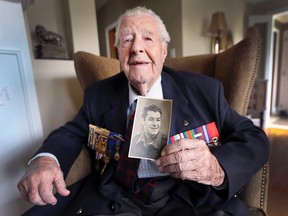
Article content
Windsor veteran Charles Davis, who participated in the largest seaborne military invasion in the history of the world, figures this might be the last time he travels to France to attend D-Day anniversary ceremonies.
But he’s said that before. And while the Second World War combat veteran is 101 years old, he remains mentally sharp and physically tough, a true member of the Greatest Generation.
Advertisement 2
Article content
Asked why he’s making the trip now — to participate in battlefield commemorations on June 6 on the beaches of Normandy marking the 80th anniversary of the mass assault on Nazi-occupied French soil — he acts like the answer is self-evident.
“I’m still breathing,” said Davis, who turns 102 in September.
“My corporal is buried there,” he told the Windsor Star. “If you’re capable, I think it’s a good thing for an old soldier to go back.”
Joining Davis as guests of Veterans Affairs Canada will be 13 other elderly Second World War veterans. Prime Minister Justin Trudeau will head up Canada’s delegation, and Prince William will join them on June 6 at Juno Beach.
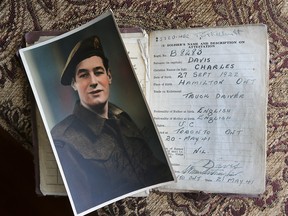
Signing up with an artillery regiment in 1941 at age 18, Pte. Davis later transferred to the Royal Canadian Service Corps and would drive ashore at Normandy four days after D-Day, behind the wheel of a Mack truck loaded with 10 tons of ammunition.
“The idea was to get on that beach and get the hell off it as quickly as possible — you went as fast as you could,” he once told a Windsor Star reporter in an earlier profile.
About 360 Canadian soldiers would die on D-Day, and more than 5,000 Canadians would be killed during the two-and-a-half month Normandy campaign, with more than 13,000 wounded. But it was a key turning point in the deadliest war in human history, and it initiated the endgame for Adolf Hitler.
Advertisement 3
Article content
Davis, who would find a young war bride in London during the war and then raise four daughters in Windsor, doesn’t glorify battle — “war is a terrible bloody thing” — but he wants Canadians, and especially younger generations, to know the sacrifices made.
“This is a great country,” he said. Eighty years later, Davis still mourns the young comrades who didn’t make it home, and he will visit some of them during two cemetery visits on this trip.
Davis was last in Normandy five years ago on D-Day’s 75th anniversary. He recalls French children enthusiastically honouring grizzled old soldiers from overseas who helped liberate the country of their grandparents.
He remembers one elderly woman who grabbed both his hands in hers, kissed him on both cheeks and then spontaneously belted out ‘O Canada’ sung in French.
“I hope younger Canadian people get to know what happened in the Second World War, and in the First World War,” Davis said ahead of his Friday departure from Windsor.
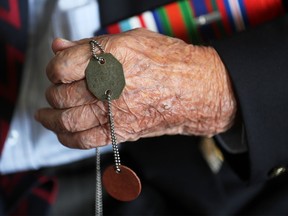
“It’s going to be a very emotional trip,” said daughter Terri Davis-Fitzpatrick, who is accompanying her father with her husband. “He feels it’s very important to pay his respects to his fallen comrades.”
Advertisement 4
Article content
There aren’t many Canadian Second World War veterans left. Only a third as many are taking part on this trip compared to the last official trip five years ago, and they range in age from 98 to 104.
This incredible, lethal theatre of death
Three of those on the current trip participated in the D-Day landings, while two others were in the Royal Canadian Navy and part of the vast invasion armada of 7,000 ships that crossed the English Channel with about 155,000 Allied troops.
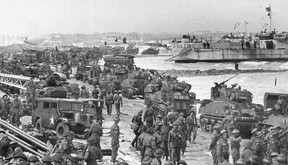
Joining Davis is another veteran with strong Windsor ties. Canadian Air Force Lt.-Gen. Richard Rohmer, who is 100, once wrote about flying over “this incredible, lethal theatre of death.”
Hamilton-born Rohmer was a 20-year-old Mustang pilot tasked with aerial reconnaissance on D-Day and assisting naval artillery to target enemy positions. One of the most decorated soldiers of the war, he trained to become a fighter pilot in Windsor and would become a commanding officer at HMCS Hunter in Windsor after the war, and much later a two-term University of Windsor chancellor.
Recommended from Editorial
Advertisement 5
Article content
One of Rohmer’s claims to fame was spotting an open-topped German staff car on one of his reconnaissance missions on July 17, 1944, and noting a high-ranking officer in the passenger seat. He reported it and a Spitfire piloted by a fellow Canadian strafed the vehicle, seriously injuring Field Marshal Erwin Rommel and taking out of the war the infamous ‘Desert Fox,’ Hitler’s pick to command the forces defending the Third Reich’s ‘Fortress Europe.’
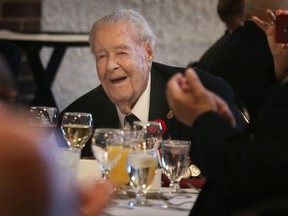
Davis-Fitzpatrick said she had to remind her dad of his age when he first broached the idea of attending the 80th anniversary ceremonies in France. Davis heard just a few months ago that an official Canadian delegation would be flying overseas, and he was on the phone.
“Are you kidding me? He’s the one who called Veterans Affairs and said, ‘I wanna go,’” Davis-Fitzpatrick recalls.
“This’ll be his last time, for sure — but we keep saying that.”
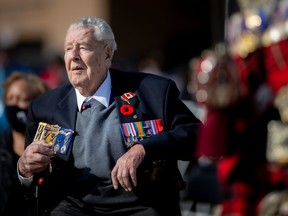
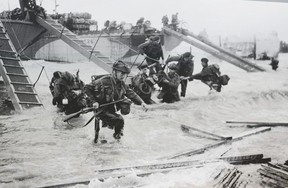
Article content






